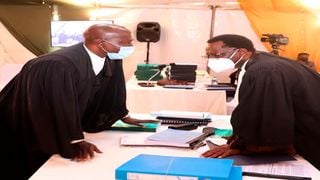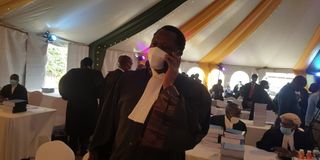
Senior counsel Mohammed Nyaoga and Solicitor-General Kenneth Ogeto (right) at the Court of Appeal in the Supreme Court building in Nairobi on June 29, 2021 during the hearing of BBI appeals.
| Dennis Onsongo | Nation Media GroupNews
Premium
BBI case: Key issues raised by President Kenyatta team
What you need to know:
- Mr Ogeto spoke as seven judges of the appellate court began hearing appeals against the High Court ruling that declared the BBI process illegal.
Attorney-General Kihara Kariuki has defended President Uhuru Kenyatta’s push to amend the Constitution through a popular initiative, arguing nothing bars him from initiating such a proposal.
The AG addressed the Court of Appeal on Tuesday through Solicitor-General Kennedy Ogeto.
Mr Ogeto spoke as seven judges of the appellate court began hearing arguments against the High Court ruling that declared the BBI process illegal.
The judges hearing the matter are Court of Appeal president Daniel Musinga, Roselyn Nambuye, Hannah Okwengu, Kairu Gatembu, Patrick Kiage, Fatuma Sichale and Francis Tuiyot.
The solicitor-general explained issues including how the High Court judges erred and what the Constitution itself states about amendments.
Mr Ogeto, who is teaming up with lawyers George Oraro and Kamau Karori, said the “open attack” on President Uhuru Kenyatta for initiating the popular initiative was unfounded.
“The Constitution states clearly that the popular initiative can be initiated, then the matter be taken to the masses for discussion and eventually a referendum conducted to amend the Constitution,” he said.
He added: “There is no basis for the claim that popular initiatives are by definition, anti-government. This regrettable claim resulted from the judges’ reliance on Wikipedia. Wikipedia cannot, surely, be a reliable authority."
Mr Ogeto said that if not overturned, the decision will open adverse proceedings against the person of the President through a multiplicity of legal proceedings, thus impairing the performance of the functions and exercise of the accompanying executive powers under the Constitution.

Solicitor-General Kennedy Ogeto during the hearing of appeals against the High Court ruling on the Building Bridges Initiative on June 29, 2021.
Structure
Mr Ogeto further said a structured method exists for amending the Constitution.
He said the Constitution is self-contained as it sets how it can be amended.
The Constitution states who should initiate the changes to the supreme law of the land in Chapter 16, he said, adding this chapter guards against the culture of hyper-amendment.
“Since the promulgation of the Constitution there have been approximately 22 attempts to amend it. Twice through the popular initiative and 20 times through the parliamentary initiative,” he said.
‘Personal opinions’
Mr Ogeto also noted that the judges who stopped the Independent Electoral Boundaries Commission (IEBC) from conducting the referendum said “the purportedly un-amendable and eternity clauses would be determined by the courts on a case to case basis”.
In so doing, he said, they arrogated themselves powers they do not have by the vesting courts with the duty of amending the Constitution on a case by case basis.
The court also heard that the High Court judges misdirected themselves in addressing issues not pursued by the petitioners who sought to stop the BBI process.
Urging the Court of Appeal judges to allow a referendum to be conducted, Mr Ogeto also told the court that the High Court judges “elevated personal opinions and preferences over the will of the people”.
“The personalised attacks against the President climaxed in factually and legally unfounded conclusions. An example is that a President can be sued in a personal capacity for official acts,” he said in submissions filed in court.
He added that the judges disenfranchised nearly four million registered voters under the pretext of nullifying alleged unconstitutional acts by President Kenyatta.
Court of Appeal judges during the hearing of appeals against the High Court ruling on the Building Bridges Initiative on June 29, 2021.
Sovereignty of the people
Mr Ogeto also accused the judges of disregarding clear provisions and effectively amending the Constitution
He further accused the judges of disregarding the decisions of the High Court, the Court of Appeal and the Supreme Court, which decided on amending the constitution.
“Our plea to this honourable court is that it reverses the extra-constitutional and anti-constitutional step taken by the High Court,” he said.
Mr Oraro said the sovereignty of the people in making and amending the Constitution must be respected by the courts.
The High Court judges erred in finding that the President can be sued in his personal capacity, he said.
He urged the appellate court judges to reverse the whole judgment and correct the errors made by the five judges.
President's rights
Mr Karori termed the High Court decision erroneous, saying the President too, has rights and can make suggestions to the people.
“He is nominated by a political party and is entitled to support the cause of his political party,” he said.
The lawyer further said it was also wrong for the judges to find that public officers cannot participate in a popular initiative process for the amendment of the Constitution and can only propose constitutional amendments through Parliament.
Mr Karori said the High Court judges ruled that the popular initiative was a preserve and monopoly of private citizens without reference to any specific provision of the constitution to support it.
He said the judges disenfranchised millions of Kenyan voters under the pretext of nullifying alleged unconstitutional acts by the President.
Four appeals were filed to challenge the judgment – by the IEBC, Attorney-General, BBI Secretariat and President Kenyatta.
The hearing continues.






